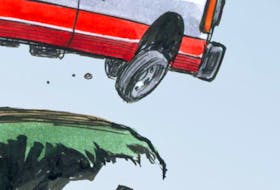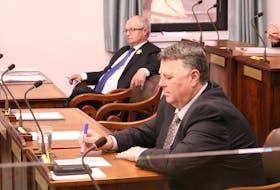A little optimism can be a fine thing. Economically, it can sell houses and cars, keep what money we have turning around and employing residents of the province, and keep people from being fiscally nervous and holding onto their cash for a rainy day.

Truth is, though, that there are very few people hanging on to anything for a rainy day in this province — or in the country as a whole. We’ve learned not only to live with low-cost debt, but to roll around in it, often to the very limits of our credit.
And that’s why it’s a little hard to fathom just what the provincial government is trying to do with its Chicken Little approach to budgeting.
The sky certainly is not falling, and Premier Dwight Ball is quite right that the province is not approaching bankruptcy, but not because we’re doing a wonderful job balancing the province’s needs with what little money we have. We’re not heading for bankruptcy because our credit is good for a different reason — because, to a practical degree, Ottawa has cosigned our mortgage. And our car loan. And our credit card consolidation loan. And everything else.
The message from the new session of the House of Assembly so far — and the economic message that we can probably expect to continue to hear on through the budget and beyond — is that people, especially young people, are eager to stay here and find new solutions for old problems. There are lots of reasons to want to stay here, and there may well be new solutions and ideas.
We’re actually in a mine, no matter how much our political leaders want us to believe it’s actually a tunnel. We can’t even pretend that there’s light up ahead until we stop digging downwards.
But the claim that this represents a light at the end of the tunnel?
It’s too early for that.
Here’s a pragmatic way to look at it: tunnels are horizontal holes through, say, a mountainside. The financial hole we’re in is continuing to head downwards, with spending exceeding revenues well into the foreseeable future. We’re actually in a mine, no matter how much our political leaders want us to believe it’s actually a tunnel. We can’t even pretend that there’s light up ahead until we stop digging downwards.
The problem is that, with the federal government essentially unable to allow a Canadian province to default on loans, we get loaned money that we probably wouldn’t otherwise get at the terms we’re able to get it now.
It’s led to a strange way of looking at borrowing. This week, Finance Minister Tom Osborne was talking in the House of Assembly about the $600 million the province wants to borrow to pay out accumulated severance to civil servants. (That decision itself is likely a fiscally responsible one, by the way, saving $25 million a year.)
Osborne argued the province will pay only $10 million to offset what would be $35 million a year in severance expenses. But think carefully about his answer.
“The $10 million is paid on interest to borrow, as the honourable member knows — he was premier at one particular point. The only time we actually pay down on loans is when there’s a surplus, and those numbers, even with their government, in the wealthiest decade this province has ever had, were far and few between, Mr. Speaker.”
Now, apply that logic to something as simple as your credit card or a car loan.
If you resolutely only pay the interest on your debt, the best you can expect is to continue to pay it in perpetuity, long after your new car or snowmobile has crumbled into rusty dust.
Imagine, instead, if the finance minister was planning to take the $25 million in savings and actually apply that money to the $600 million in borrowing. Twenty-four years down the road, we’d actually be able to take that $35 million a year and apply it to other needs, instead of borrowing. But that’s clearly a massive change in mindset. Managing only interest costs, no matter how politically necessary, is not managing debt costs.
Let’s not tell young Newfoundlanders and Labradorians how bright the future is until we actually make a commitment to pay for the debt we’ve racked up on their behalf.
This is a wonderful place to live, but we’re all going to have to make significant sacrifices now to prevent a looming debt crisis from arriving and sucking up all of our options, except exporting money to foreign lenders.
You don’t get out of a hole until you stop digging, no matter how optimistic you are about it.
Russell Wangersky is SaltWire Networks’ Atlantic regional columnist, His work appears in 39 newspapers and websites across Atlantic Canada, and he can be reached at russell.wangersky@thetelegram.com — Twitter: @Wangersky.








